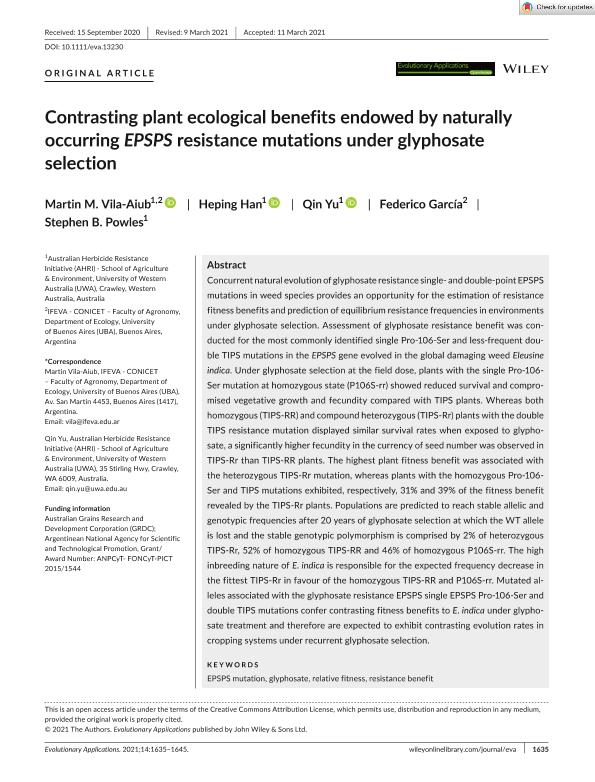Mostrar el registro sencillo del ítem
dc.contributor.author
Vila Aiub, Martin Miguel

dc.contributor.author
Han, Heping
dc.contributor.author
Yu, Qin
dc.contributor.author
García, Federico

dc.contributor.author
Powles, Stephen B.

dc.date.available
2022-09-12T03:17:23Z
dc.date.issued
2021-03
dc.identifier.citation
Vila Aiub, Martin Miguel; Han, Heping; Yu, Qin; García, Federico; Powles, Stephen B.; Contrasting plant ecological benefits endowed by naturally occurring EPSPS resistance mutations under glyphosate selection; Wiley Blackwell Publishing, Inc; Evolutionary Applications; 14; 6; 3-2021; 1635-1645
dc.identifier.issn
1752-4571
dc.identifier.uri
http://hdl.handle.net/11336/168232
dc.description.abstract
Concurrent natural evolution of glyphosate resistance single- and double-point EPSPS mutations in weed species provides an opportunity for the estimation of resistance fitness benefits and prediction of equilibrium resistance frequencies in environments under glyphosate selection. Assessment of glyphosate resistance benefit was conducted for the most commonly identified single Pro-106-Ser and less-frequent double TIPS mutations in the EPSPS gene evolved in the global damaging weed Eleusine indica. Under glyphosate selection at the field dose, plants with the single Pro-106-Ser mutation at homozygous state (P106S-rr) showed reduced survival and compromised vegetative growth and fecundity compared with TIPS plants. Whereas both homozygous (TIPS-RR) and compound heterozygous (TIPS-Rr) plants with the double TIPS resistance mutation displayed similar survival rates when exposed to glyphosate, a significantly higher fecundity in the currency of seed number was observed in TIPS-Rr than TIPS-RR plants. The highest plant fitness benefit was associated with the heterozygous TIPS-Rr mutation, whereas plants with the homozygous Pro-106-Ser and TIPS mutations exhibited, respectively, 31% and 39% of the fitness benefit revealed by the TIPS-Rr plants. Populations are predicted to reach stable allelic and genotypic frequencies after 20 years of glyphosate selection at which the WT allele is lost and the stable genotypic polymorphism is comprised by 2% of heterozygous TIPS-Rr, 52% of homozygous TIPS-RR and 46% of homozygous P106S-rr. The high inbreeding nature of E. indica is responsible for the expected frequency decrease in the fittest TIPS-Rr in favour of the homozygous TIPS-RR and P106S-rr. Mutated alleles associated with the glyphosate resistance EPSPS single EPSPS Pro-106-Ser and double TIPS mutations confer contrasting fitness benefits to E. indica under glyphosate treatment and therefore are expected to exhibit contrasting evolution rates in cropping systems under recurrent glyphosate selection.
dc.format
application/pdf
dc.language.iso
eng
dc.publisher
Wiley Blackwell Publishing, Inc

dc.rights
info:eu-repo/semantics/openAccess
dc.rights.uri
https://creativecommons.org/licenses/by/2.5/ar/
dc.subject
EPSPS MUTATION
dc.subject
GLYPHOSATE
dc.subject
RELATIVE FITNESS
dc.subject
RESISTANCE BENEFIT
dc.subject.classification
Agronomía, reproducción y protección de plantas

dc.subject.classification
Agricultura, Silvicultura y Pesca

dc.subject.classification
CIENCIAS AGRÍCOLAS

dc.title
Contrasting plant ecological benefits endowed by naturally occurring EPSPS resistance mutations under glyphosate selection
dc.type
info:eu-repo/semantics/article
dc.type
info:ar-repo/semantics/artículo
dc.type
info:eu-repo/semantics/publishedVersion
dc.date.updated
2022-08-23T20:54:24Z
dc.journal.volume
14
dc.journal.number
6
dc.journal.pagination
1635-1645
dc.journal.pais
Reino Unido

dc.journal.ciudad
Londres
dc.description.fil
Fil: Vila Aiub, Martin Miguel. Consejo Nacional de Investigaciones Científicas y Técnicas. Oficina de Coordinación Administrativa Parque Centenario. Instituto de Investigaciones Fisiológicas y Ecológicas Vinculadas a la Agricultura. Universidad de Buenos Aires. Facultad de Agronomía. Instituto de Investigaciones Fisiológicas y Ecológicas Vinculadas a la Agricultura; Argentina. University of Western Australia; Australia
dc.description.fil
Fil: Han, Heping. University of Western Australia; Australia
dc.description.fil
Fil: Yu, Qin. University of Western Australia; Australia
dc.description.fil
Fil: García, Federico. Consejo Nacional de Investigaciones Científicas y Técnicas. Oficina de Coordinación Administrativa Parque Centenario. Instituto de Investigaciones Fisiológicas y Ecológicas Vinculadas a la Agricultura. Universidad de Buenos Aires. Facultad de Agronomía. Instituto de Investigaciones Fisiológicas y Ecológicas Vinculadas a la Agricultura; Argentina
dc.description.fil
Fil: Powles, Stephen B.. University of Western Australia; Australia
dc.journal.title
Evolutionary Applications

dc.relation.alternativeid
info:eu-repo/semantics/altIdentifier/doi/http://dx.doi.org/10.1111/eva.13230
dc.relation.alternativeid
info:eu-repo/semantics/altIdentifier/url/https://onlinelibrary.wiley.com/doi/10.1111/eva.13230
Archivos asociados
